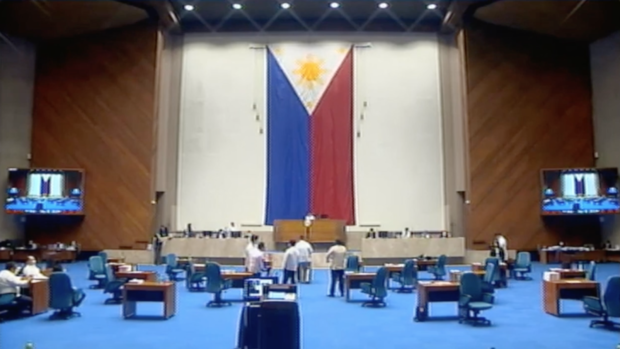
(FILE PHOTO) Screenshot from the House of Representatives Youtube account
MANILA, Philippines — The House of Representatives will resume its debates on charter change (Cha-cha) on January 13, but lawmakers assured that discussions will only be on proposed amendments in the economic provisions of the 1987 Constitution.
Ako Bicol party-list Rep. Alfredo Garbin Jr., who chairs the House Committee on Constitutional Amendments, said the panel will tackle Resolution of Both Houses No. 2 which was filed by Speaker Lord Allan Velasco back in July 2019.
Garbin explained that Velasco’s resolution only proposes amendments to the economic provisions of the Constitution amid concerns that Cha-cha is being pushed to extend the term of lawmakers, as well as the President, especially with the approaching 2022 elections.
“The Proposed Resolution contains seven sets of proposed amendments to the 1987 Constitution addressing specific economic provisions. The amendments would be presented to the Filipino people after gaining at least three-fourths vote of the two chambers of Congress voting separately,” Garbin said in a statement.
Under Velasco’s proposal, the phrase “unless otherwise provided by law” shall be added in several sections of Article XII (National Patrimony and Economy), Article XIV (Education, Science and Technology, Arts, Culture, and Sports), and Article XVI (General Provisions).
This includes provisions on limiting the ownership and management of mass media and educational institutions to citizens of the Philippines.
“As can be seen in the texts of the seven sets of proposed amendments, the words UNLESS OTHERWISE PROVIDED BY LAW which means the actual effective amendments to the provisions would be laws yet to be filed and enacted,” Garbin said.
“Permission is being sought from the Filipino people to entrust to Congress the enactment of exceptions to the general rules stated in particular economic provisions of the 1987 Constitution. That is what the Resolution seeks to achieve: get the authorization of Filipino voters to enact the laws setting the exceptions. Nothing more,” he added.
In a separate statement, Garbin said that the proposed amendments in the economic provisions of the Constitution is not a waste of time and money even as the country continues to grapple with the coronavirus pandemic.
According to Garbin, the COVID-19 pandemic’s impact to the country’s economy underscored the need to amend the “restrictive” economic provisions of the 1987 Constitution.
These restrictive provisions, Garbin said, “impede the inflow of funds and investments crucial to enable us recover from the havoc brought upon by this public health crisis.”
“And if we want to better position the Philippines, Charter change must happen now because our economy is still a long way from full recovery,” Garbin said.
The lawmaker likewise assured that the constitutional amendments will be taken up with fairness and transparency.
In the Senate, Senators Francis Tolentino and Ronald Dela Rosa have also filed a resolution convening Congress into a constituent assembly to introduce “limited” amendments to the Constitution.
But unlike the House’s resolution, the senators’ resolution states that the amendments include “democratic representation” aside from the economic provisions.
It is unclear, however, what the proposed amendments on democratic representation are.
gsg